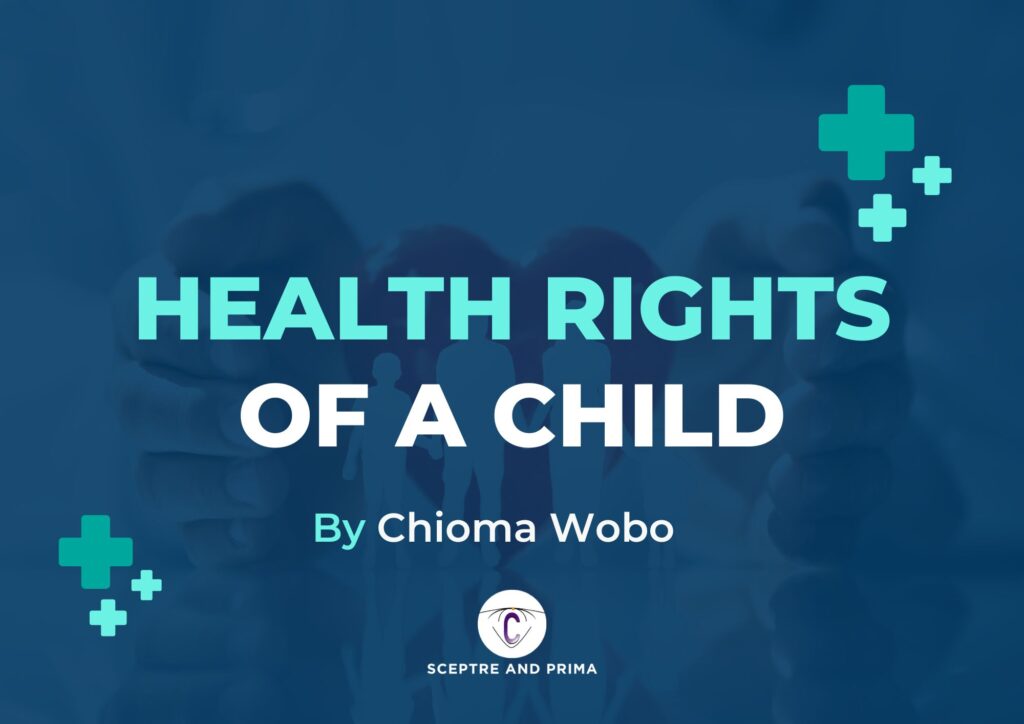The health rights of a child encompass the entitlements and protections granted to ensure their optimal health and well-being. These rights include access to healthcare services, nutritious food, clean water, a safe environment, protection from harm, and opportunities for physical and mental development. They are enshrined in international conventions, regional agreements, and state laws to safeguard the health and dignity of every child (see Art. 24 UNCRC, Art. 14 ACRWC, and S. 11 CRA 2003).
RIGHT TO BE INFORMED
When addressing children’s right to healthcare, a holistic view must be taken. The right of a child to be informed is an area that is often neglected.
Parents, state parties, and healthcare professionals act on behalf of children when it comes to their health. It is duly important to note that children have the right to be informed about matters related to their health. As stated in Section 7(1) of the Nigerian Child’s Rights Act No. 26 (CRA) 2003, “Every child has the right to freedom of thought, conscience, and religion.” Children also have the right to receive and impart ideas and information as enshrined in Section 39(1) of the 1999 Constitution of the Federal Republic of Nigeria (as amended). (See also Articles 12 and 13 of the UNCRC.)
This right to be informed is essential, as it provides children with knowledge and allows them to form their thoughts and opinion.
Informing children about their healthcare fosters a sense of responsibility, helping them understand and manage their health. For instance, research shows that children with long term ailments tend to be more responsive and participate in their routines when they are informed of their diagnosis.[i]1
The importance of informing children about their healthcare is immense. The benefits extend beyond individual children, positively impacting the community and improving the overall quality of healthcare delivery.
Article 12 of the United Nations Convention on the Rights of the Child states,
“States Parties shall assure to the child who is capable of forming his or her views the right to express those views freely in all matters affecting the child, with the views of the child being given due weight according to the age and maturity of the child.”
Section 39 of the Constitution of the Federal Republic of Nigeria, 1999 (as amended), affirms that
“Every person shall be entitled to freedom of expression, including freedom to hold opinions and to receive and impart ideas and information without interference.” This right to freedom of expression also includes the child’s right to be informed.
PARTICIPATION
Children’s participation in their healthcare process is a fundamental aspect of fulfilling their health rights. This also aligns with Article 12 UNCRC which emphasises the child’s right to express their views on matters affecting them, including healthcare choices and for these views to be considered.
Participation is a never-ending process and does not stop with children’s views being expressed, it also involves healthcare providers, parents and children co-producing decisions. This encourages children and adults to work together for meaningful participation and better outcomes.
Participation contributes to improving practices by developing more effective partnerships with healthcare professionals.
Participation contributes to improving practices by developing more effective partnerships with healthcare professionals. The participation of children in their healthcare can be fostered by:
- Facilitating communication: Involving children in a developmentally appropriate manner is essential for promoting their active participation in healthcare decisions.
- Enhancing professional capacity: Professionals working with children must have the requisite knowledge and skills to facilitate meaningful participation. This can be achieved through training.
- Respecting voluntary participation: Children should be made aware that participation is voluntary. They should have the option to choose the extent to which they want to be involved and the right to withdraw from any process at any time.
- Providing feedback: Children should be given feedback on how their views have been interpreted and used, and how they have influenced outcomes.
BEST INTEREST OF THE CHILD
At the crux of the health rights of a child is the best interest of the child. The best interest of the child is a fundamental principle in child health rights. It emphasizes making decisions and taking actions that prioritize a child’s well-being and development. Considering the child’s best interests in matters of their health ensures that healthcare decisions address their physical, mental, and emotional needs. This approach leads to better health outcomes, supports long-term development, and lays the foundation for a healthier society. As stated in Section 1 of the Nigerian Child’s Rights Act No. 26 (NCRA) 2003, “the best interest of a child shall be of paramount consideration in all actions.” See also Article 2 of the UNCRC.
When determining the best interest of a child, several factors play a role.
They are all parts that make up a whole which is the best interest of the child. Therefore, it is important to recognize and address these diverse factors as they ensure a comprehensive approach to promoting and safeguarding the child’s right to health.
CONCLUSION
Children’s health rights are crucial as they ensure well-being, growth, and development. These rights protect children from harm, illness, and neglect, enabling them to reach their full potential physically, mentally, and emotionally. Upholding children’s health rights lays the foundation for a healthy and productive society in the future.
- Joane Wolfe, Barbara L. Jones, Ulrika Kreicbergs and Momcilo Janovic (trs), Palliative Care in Pediatric Oncology ISBN 978-3-319-61391-8 (Springer International Publishing AG 2018) ↩︎


